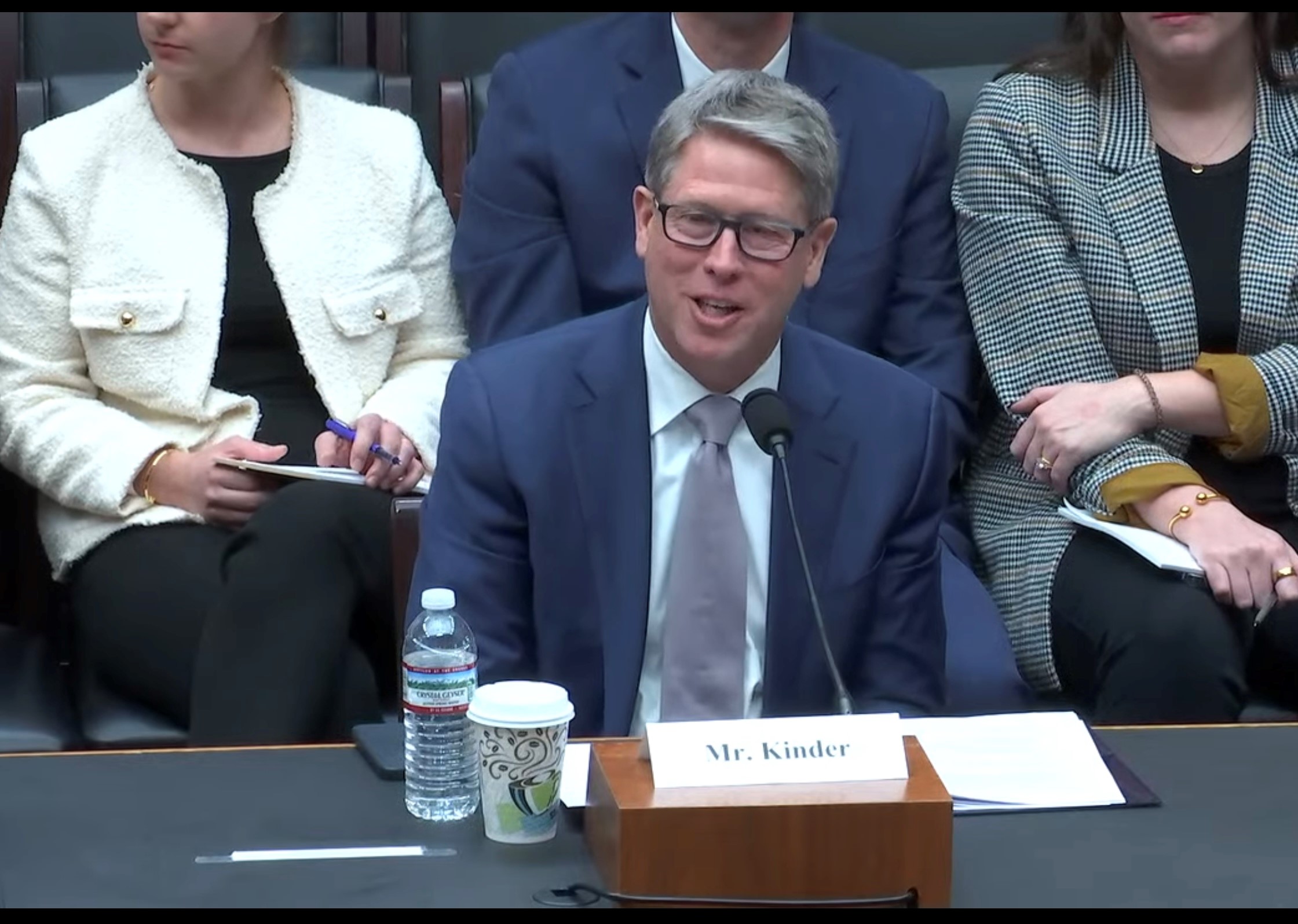
Jeff Kinder testifying before the House Committee on Energy and Commerce about the future of AI in manufacturing in February 2025.
Recently, Jeff Kinder, EVP, design and manufacturing at Autodesk, met with policymakers in Washington, D.C. to discuss how AI is rapidly developing and transforming the manufacturing sector. He discussed ways to support small and medium size manufacturers in their digital journey to make them more efficient and competitive and bolster American leadership in the industry. These meetings served as a continuation of the conversation Autodesk began engaging in earlier this year when Jeff testified before the House Committee on Energy and Commerce.
It is a highly dynamic time in the manufacturing industry. The pandemic exposed weaknesses across the manufacturing ecosystem. Manufacturers had to realign and reimagine their supply chains in real time, while simultaneously learning how to harden themselves against future shocks. Significant disruptions caused shortages of raw materials and finished products, including essential goods.
The post-pandemic years have been filled with equally significant challenges that tested the resiliency of manufacturers. Inflation increased costs for an industry that operates on tight margins. The evolving geopolitical environment has exposed additional risks. A confluence of factors, like demographic shifts and an aging workforce, alongside the rise of new technologies, have created a significant shortage in labor and skills. And yet, demand for products continues to expand, due to the growing global population and increased interest in high-quality, customized products. In short, the US manufacturing industry has a capacity problem–not enough resources, labor, and time to meet demand.
The good news is we have a solution available to us: digital transformation.
Manufacturers know digital tools and technology are necessary to remain competitive but executing a transformation can be challenging–it is complex, time-intensive, and requires new skills as well as investment.
At Autodesk, we are democratizing cutting-edge technology by offering manufacturers the same advanced capabilities at a fraction of the cost. We believe empowering SME manufacturers with technology is the key to unleashing a new renaissance of American manufacturing. A healthy and robust ecosystem of SME manufacturers not only supports good-paying jobs; it also supports supply chain resiliency and flexibility – which ultimately contributes to U.S. economic and national security.
Sustaining the strength of American manufacturing requires a relentless focus on innovation and productivity to remain competitive in our current macroeconomic environment. Empowering manufacturing workers with increasingly powerful technology, such as AI, is the way to do this. Manufacturers are ready. They are eager to stay ahead of global competition and willing to adopt digital capabilities–including AI–that make them more productive. It is in our national interest to help them get there.
Autodesk is focused on developing AI capabilities that help product designers and manufacturers do their work more effectively and efficiently. Specifically, we aim to reduce the repetitive tasks that traditionally require tedious manual work or significant overhead, address key pain points in the manufacturing process, minimize error, and free up more time for creative work and innovation.
Additionally, our AI facilitates improved decision making at all points in the product development and manufacturing process. As supply chains get more complex and production cycles get shorter, our AI augments the decision making of human experts by factoring in the many variables from available material, labor, manufacturing technologies, and supply chain options, to name a few. This translates to improved global competitiveness for manufacturers.
How do we achieve this? We recommend the following for policymakers to consider:
- Promote the benefits of AI for manufacturing and global competitiveness. Partner with technology companies and manufacturers to develop national strategies that elevate the benefits and importance of AI for the future of American manufacturing. This effort should also identify and propose ways to mitigate obstacles to the adoption of AI in manufacturing.
- Accelerate digital transformation for small and medium manufacturers. Targeted tax credits and access to low-cost capital for modernizing software and machinery are essential to enhancing the sector’s resilience and the industry’s global competitiveness, particularly for SME manufacturers. These would help drive needed investments in digital transformation from manufacturers, which is foundational to AI adoption.
- Encourage the development and adoption of interoperability standards. AI relies on data to train models. Industry standards that improve interoperability of hardware and software tools used in manufacturing will promote better data flow and sector efficiency. This will enable manufacturers to upgrade or integrate their technologies more easily and cost effectively.
- Include factory design, construction, and operations in manufacturing initiatives. Leveraging digital tools to design, build, and operate factories is a key opportunity for manufacturers to realize savings and efficiencies that support business growth. Initiatives supporting U.S. manufacturing should also prioritize ways to support the development of the most advanced and digitally connected, AI-enabled factories.
- Continue to support the Manufacturing USA Institutes and Manufacturing Extension Partnerships (MEPs). Continued support for these programs is crucial to innovation, regional manufacturing ecosystems, and SMEs. They should launch new initiatives focused on accelerating SME digital transformation and AI adoption.
- Target limited workforce resources to dedicated training for key sectors like manufacturing with a focus on digital and STEM skills. This targeted approach will ensure economic competitiveness and help new and displaced workers upskill in the use of AI-enabled tools.
- Support industry-led apprenticeships and programs that connect business and educators to identify skills gaps and develop tailored curriculums to train students and mid-career workers. Strengthening the school-to-career pipeline is essential for building a resilient, digitally skilled workforce.
Embracing AI in manufacturing will not only strengthen the resilience and competitiveness of the manufacturing industry but also fuel long-term economic growth and prosperity. Autodesk stands ready as a committed partner, offering insights, technology, and expertise to help turn this vision into reality.
Additional detail on Autodesk’s manufacturing policy agenda can be found here.